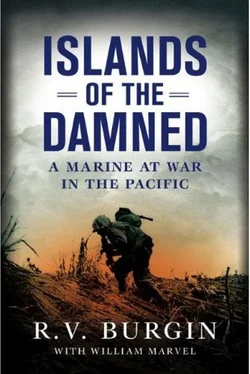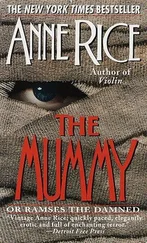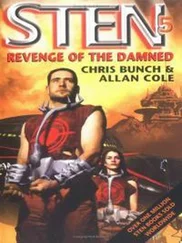We got orders to dig in and concentrate our fire on the infantry. Digging in the rock-hard coral was impossible, so we found craters and set up the mortars and began lobbing shells into the field.
The tank battle was no contest. Those little Jap tanks were thin-skinned and fragile, and our own Shermans, plus fire from bazookas and artillery, just tore the whole column apart in minutes. The foot soldiers melted away. We blinked and they were gone. Afterward, pieces of their tanks were scattered across the airfield like insect parts under a spiderweb.
But strung out along the edge of the scrub, we now had a fresh problem.
Sledge was holding a 60mm shell, just ready to drop it down the tube, when bullets started whining over our heads. They were coming from behind us. A stream of tracers passed over, close enough to dust his knuckles.
I turned in time to look down the barrel of a Sherman tank, its turret swiveling in our direction. He was parked in a clearing a hundred yards to our right. Beyond him came more tanks, and behind them, Marine riflemen, and they were shooting. Not past us, but at us!
Someone yelled at Sledge, and he froze. If a bullet hit that shell we’d all be blown to hell.
It was instantly clear to me what had happened. While we had been trying to catch up with the Seventh’s Third Battalion in the woods, they had been behind us, waiting. Then they saw our mortar squad in front and assumed we were part of the Jap counterattack and opened fire. Those bright .50-caliber tracers that the Sherman tank was spitting would soon be followed by a 75mm shell from its cannon.
Everyone scrambled for cover. A shell crashed into the scrub just ahead of us.
I shouted, “Secure the mortars!” and took off toward the tanks, dodging from tree to tree and waving my arms. “Knock it off! Knock it off! You’re gonna kill the whole damn bunch!”
Somehow over the racket I caught someone’s attention and the firing died away.
In all the panic and confusion after the Seventh Marines had started firing at us, I did something that I’m not particularly proud of. Or I came very close to doing it.
One particular lieutenant had been making our lives miserable ever since we were on New Britain. Not that he was strict—he was worse. He was two-faced. He’d lie and cover up. He’d order us to do something, then when someone higher up came down on him, he’d come down on us for doing what he’d told us to do in the first place. When he was needed, he could never be found. He had a way of disappearing when things got nasty. I’d already had one set-to with him that morning over a mortar emplacement.
When the Seventh Marines opened fire, I saw him do something no Marine should ever do: He turned and flat out ran. That yellow son of a bitch, I thought, running like that. I brought my M1 rifle up and got him in my sights. My finger was on the trigger. He vanished behind a log.
That yellow bastard, I thought. But I didn’t shoot. Am I proud? Not particularly. If I had it to do over again, I wouldn’t shoot him. It’s a good thing I didn’t.
* * *
It got dark pretty quickly. We still had no idea where I Company or L Company were situated, nor where we were supposed to be. Back at our battalion command post, behind the front lines, nobody knew where any of us were.
Sometime after the tank battle, a Jap mortar round had landed squarely on the post, spraying our commanding officer, Lieutenant Colonel Austin Shofner, with shrapnel and taking off the head of his communications officer, Captain R. F. Kehoe, Jr.
Shofner’s wounds were serious enough to force his evacuation to a hospital ship. In the confusion word spread that he had been killed. He was almost a legend to us. He had been fighting on Corregidor when they surrendered to the Japs. They took him prisoner and he survived the Bataan Death March. After almost a year in a prison camp he organized a successful escape party and came back to the Marines to fight again.
Now, at the end of the first day of the invasion, Third Battalion’s commanding officer lay wounded and out of commission. Our executive officer and communications officer were both dead. There was no longer any effective command. And we were scattered along a thin line through scrub jungle, out of touch with everyone else and surrounded by the enemy.
Our canteens were almost empty. We’d used up most of our ammunition. It was impossible to dig shelters, so we piled up rocks and logs and set up a perimeter defense. Machine guns rattled in the darkness and we fired off a few mortar rounds, more to make us feel good than to make the Japs feel bad.
From time to time a Navy destroyer lying offshore would fire a star shell. It would burst over our heads and come floating down on its parachute, shedding a yellowish glow over everything.
But it cast no light for us. Our luck had run out.
CHAPTER 1
A Marine’s Story
They talk about the Greatest Generation. I’ve always thought the greatest generation that ever lived were my parents.
My dad, Joseph Harmon Burgin, was about six feet two. My mother, Beulah May Perry Burgin, was about five feet two. He could hold his arm straight out and she could walk under it and never touch it. I guess I took after my dad, but not quite as tall. I was only six one.
I was born in 1922, the third of seven children. I had two older sisters, three younger brothers and one younger sister.
My father had three younger brothers: George Burgin was the second child, and the twins, Remus and Romus. That’s where I got my name, that and a four-year-old kid in our neighborhood named Valton Woods. Mother had never heard the name Valton, but she liked it. So, Romus Valton Burgin. There’s not that many of us out there, I’ll tell you.
All of us Burgin boys were in the military. Edgar and Bobby, my two youngest brothers, served in the Korean War. My other brother, Joseph Delton Burgin—we called him J.D.—was killed by artillery in Alsace-Lorraine on February 17, 1945. He had just got there.
I chose the Marines under circumstances I’ll tell you about later.
In 1955 my mother and dad’s farmhouse burned down, and all of our records, all my war souvenirs and everything else went with it. Nothing saved except a cedar chest and maybe a bed or two.
The farm was about eight miles from Jewett, Texas, which is seven miles southwest of Buffalo, almost halfway between Dallas and Houston. We were about three miles off Highway 79, running from Bryan to Palestine. My dad owned sixty acres, and then he had what we called “free range.” I don’t know who owned it. Most of it was timber-land where we’d turn the cows out in the wintertime. In the summer and spring we’d keep them penned up in our pasture.
For the first six years, I went to a two-room schoolhouse, Friendship School. So did my two older sisters and one younger brother. When I finished the sixth grade in 1935, they consolidated the schools. After that we rode the bus into Jewett.
We had horses and mules, cultivators, middlebuster turning plows, planters. But no tractor. My father raised corn, cotton, sugarcane, and sorghum and we made sorghum syrup and ribbon cane syrup. But the cotton was his money crop. That was about the only money crop. I picked cotton from the time I was about three or four years old. My parents would give us a little sack, and we’d go along the rows and pick cotton. The one thing my mother and dad never did, they never did hold us out of school to help on the farm. But we would come in from school and change clothes and hit the field until dark. We helped Saturdays, Sundays and whenever we needed to get something done.
When we “lay by,” as my dad called it—plowed for the last time, everything kind of waiting on the harvest—then he would take us down to Birch Creek and we’d fish. There wasn’t anything in there but just little perch and little catfish. That was all it was. But it was a good outing.
Читать дальше











